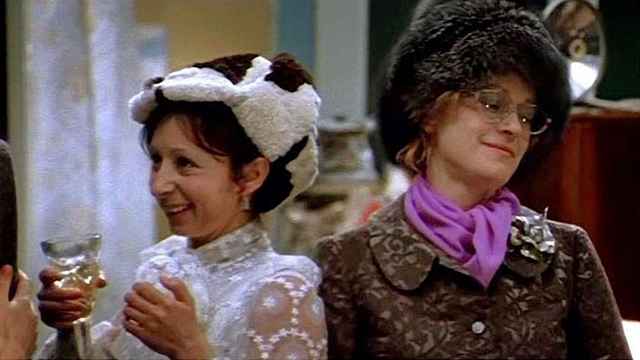It may be the most respected and storied Russian theater ever founded and maintained outside the borders of Russia. The Ilkhom Theater of Tashkent, Uzbekistan, became a legend in its own time during the tenure of founding director Mark Weil. Both the legend and the theater have continued to grow after Weil's tragic death in 2007 — he was murdered as he returned home following a late rehearsal just before the 2007-2008 season was to begin.
Weil's accomplishments were even more astonishing when you consider the time and place, in which he lived.
It was 1976, still deep in the Brezhnev era, when Weil opened the doors of what was a true anomaly in the Soviet period — an independent theater with no ties whatsoever to the government. By 1979 the theater embarked on its first tour — to the Moscow suburb of Zvenigorod. The director's fame spread so quickly that by 1983 he was invited to mount the first of many productions he would create at the Mossoviet Theater in Moscow. Ilkhom embarked on its first international tour to Bulgaria in 1987.
Ilkhom's energetic, deeply committed style of acting and production eventually brought it worldwide renown through tours to Germany, Norway, Ireland, Italy, the Netherlands, and the United States in the 1990s and 2000s. Weil was invited to stage plays in numerous theaters in the United States, cultivating a particularly close relationship with the University of Washington at Seattle, where he helped established an exchange program for American students wishing to experience Russian theater on Uzbek soil.
Lainie Mullen was one of those students whose life was changed by Weil's work. An exchange student from the University of Washington, she spent two years at Ilkhom from 2006 to 2008, witnessing the director's final production and his tragic end in 2007.
"I came here and I didn't want to leave," Mullen told me last weekend. Despite the fact that the experience was "far more difficult" than she ever expected, she realized she had discovered "an incredible place and an incredible vision."
That vision called to her again in late 2012 and she returned, perhaps, to do some directing, acting and to study the history of the place that so affected her.
In the early days, Mullen explained, the members of the theater company all worked in other professional theaters around Tashkent. As a result, they could only gather to perform at Ilkhom late in the evening after all their shows elsewhere had concluded.
People are still working for very small salaries, Mullen pointed out, but they do it in order to "do something personal, straight from the heart."
Marina Turpishsheva, one of the original company members, told me how she balanced work at Ilkhom and another theater in town for nine years. But one day Weil came to her and said it was time to make a choice. Ilkhom had grown enough so that it required a fully committed troupe. Turpishcheva left her comfortable position at a state theater and remained with Ilkhom, where she continues to work today.
Weil's death, whose reasons remain murky but were probably connected with the challenging themes he pursued in a deeply conservative society, sent shock waves throughout the world of Russian theater. Understandably, it was a tragedy that shook Ilkhom to its foundations.
"The course of the theater was utterly changed," Mullen suggested, "or maybe I shouldn't say 'course' because they're still following the direction of doing experimental work, talking about contemporary times and what issues to everyday people deal with — but now there is no Mark Weil. It has changed a lot, because you can't just remove a great artist without it having an effect."
The theater's name means "inspiration," Mullen explained, adding that Weil "helped people to learn about themselves, about what they believe in. For some reason it became magical."
Following Weil's death the company voted to name Boris Gafurov, the theater's leading actor, as its new leader. He has continued to build the theater's reputation as a place for experimentation. The theater has forged a strong working relationship with hot Moscow director Vladimir Pankov, whose production of "Seven Moons" in 2010 was as big a hit as any in the theater's past.
Ilkhom also keeps up its involvement in the world theater community by regularly mounting mini-festivals of readings of plays from various countries, including Germany, Israel, Great Britain and the United States. I was in Tashkent for Days of Contemporary American Drama, which presented staged readings of Nilo Cruz's "Anna in the Tropics," Deborah Zoe Laufer's "End Days" and Suzan-Lori Parks' "The Book of Grace."
To hear more of Lainie Mullen's story about Ilkhom, click here to watch a video I made of her speaking in the Ilkhom foyer.
A Message from The Moscow Times:
Dear readers,
We are facing unprecedented challenges. Russia's Prosecutor General's Office has designated The Moscow Times as an "undesirable" organization, criminalizing our work and putting our staff at risk of prosecution. This follows our earlier unjust labeling as a "foreign agent."
These actions are direct attempts to silence independent journalism in Russia. The authorities claim our work "discredits the decisions of the Russian leadership." We see things differently: we strive to provide accurate, unbiased reporting on Russia.
We, the journalists of The Moscow Times, refuse to be silenced. But to continue our work, we need your help.
Your support, no matter how small, makes a world of difference. If you can, please support us monthly starting from just $2. It's quick to set up, and every contribution makes a significant impact.
By supporting The Moscow Times, you're defending open, independent journalism in the face of repression. Thank you for standing with us.
Remind me later.






